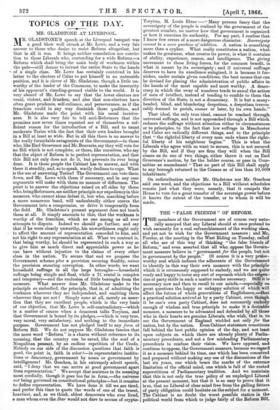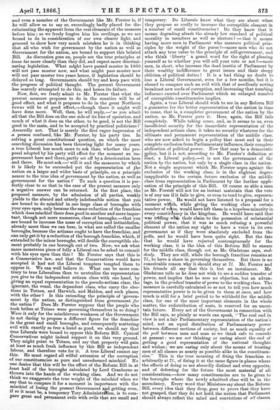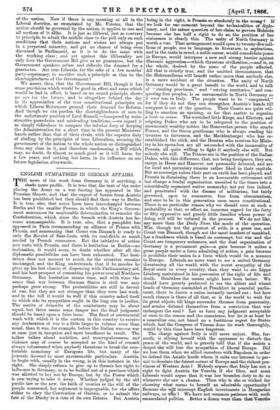THE "FALSE FRIENDS" OF REFORM.
THE members of the Government are of course very natu- rally annoyed that any Liberal should at once pretend to wish earnestly for a real enfranchisement of the working class,, and yet not to wish for the Government measure • and Mr.. Forster, at the meeting in the West Riding on Tuesday, called all who are of this way of thinking "the false friendaof Reform," and even asserted that all who oppose the Govern- ment measure believe in "government for the people, but not in government by the people." Of course it is a very praise- worthy zeal which induces the adherents of the Government to identify in this way their own measure with the principle which it is erroneously supposed to embody, and we are quite ready and happy to incur any sort of reproach which the exigen- cies of party strife in such a matter render necessary. Still it is necessary now and then to recall to our minds,—especially on great questions the happy or unhappy solution of which will affect the future of whole generations of Englishmen,—that a practical solution arrived at by a party Cabinet, even though it be one's own party Cabinet, does not necessarily embody enough of wisdom and true principle to make it a desirable measure, a measure to be advocated and defended by all those who in their hearts are genuine Liberals, who wish, that is' to see the Government of England wielded not only for the nation, but by the nation. Even Cabinet statesmen sometimes fall behind the best public opinion of the day, and not least upon subjects on which there are already plenty of Parlia- mentary precedents, and not a few misleading Parliamentary precedents to confuse their vision. We have opposed, and continue to oppose, the Government measure, because we regard it as a measure behind its time, one which has been conceived and prepared without making any use of the discussions of the last six years, one which bears the marks of the extreme limitation of the official mind, one which is full of the rooted superstitions of Parliamentary tradition. And we maintain that this is not only the true policy of an unpledged Liberal at the present moment, but that it is so easy to prove that it is so, that no Liberal of clear mind free from the galling fetters of party obligation could hesitate on the subject for a moment. The Cabinet is no doubt the worst possible station in the political world from which to judge fairly of the Reform Bill, and even a member of the Government like Mr. Forster is, if he will allow us to say so, exc,eedingly.badly placed for dis- criminating the apparent from the real elements of the measure before hint ; so we freely forgive him his revilings, as we are bound to do in consideration of our own clearer light, and proceed to show how very much mistaken he is in thinking that all who wish for government by the nation as well as Government for the nation, are bound to support this belated Bill. As discussion goes on, people see the true principles at issue far more clearly than they did, and expect more discrimi- nating legislation. What might have passed muster in 1860 will not pass muster now, and what might pass muster now will not pass muster two years hence, if legislation should be delayed so long. Governments should try and keep pace with the progress of political thought. The present Government has scarcely attempted to do this, and hence its failure.
Now, first, we freely admit to Mr. Forster that what the present measure proposes to do in the counties will be of good effect, and what it proposes to do in the great Northern towns will be of good effect,—though there it might well have done more. Well, then, he will reply,—' as you admit all that the Bill does on the one side of its line of operation, and much of what it does on the other, to be good, is not the Bill good in the main, and to be accepted by practical politicians ?' Assuredly not. That is merely the first vague impression of a person confused, like Mr. Forster, by his party ties. In -solving a great constitutional question, on which the most -searching discussion has been throwing light for many years, A true Liberal has much more to ask than whether the pro- posal adopted by his party will effect for the moment an im- provement here and there, partly set off by a deterioration here and there. He must ask,—' will it and the measures by which it is likely to be succeeded put the representation of )he nation on a larger and wider basis of principle, on a principle nearer to the true idea of government by the nation, as well as government for the nation ?' To such a question it is per- fectly clear to us that in the case of the present measure only a negative answer can be returned. In the first place, the proposed measure, by the admission of all parties, weakly yields to the absurd and utterly indefensible notion that you are bound to do mischief in one large class of boroughs with your eyes open, only because the same reduction of the franchise -which does mischief there does good in another and more impor- tant, though not more numerous, class of boroughs,—that you are bound to increase the mass of corruption and intimidation, already more than we can bear, in what are called the smaller boroughs, because the artisans ought to have the franchise, and can only get it by a reduction of the borough franchise, which, if • 'extended to the minor boroughs, will double the corruptible ele- ment probably in one borough out of two. Now, we ask what more monstrous piece of folly a Liberal can be asked to commit with his eyes open than this ? Mr. Forster says that this is a Conservative law, and that the Conservatives would have accepted it had not the Liberal tempters tempted them to oppose it. We can well believe it. What can be more con- trary to true Liberalism than to neutralize the representation you give to the independent artisan class with one hand, by giving an equal representation to the pseudo-artisan class, the .ignorant, the venal, the dependent class, who carry the elec- tions in Totnes, and Harwich, and Maldon, and such places, with the other ? Is this extending the principle of 'govern- ment by the nation as distinguished from government for the nation ?' Does nation, Forster suppose that the people who took bribes at Totnes were governing themselves in so doing? Were it only for the mischievous weakness of the Government in not daring to propose a different figure for the franchise in the great and small boroughs, and consequently scattering evil with exactly as free a hand as good, we should say that -true Liberals were bound to oppose this Reform Bill. Cynical -Conservatives might indeed support it on this very ground. They might point to Totnes, and say that property will gain • -at least as much fresh influence by this Bill as independent labour, and therefore vote for it. A true Liberal cannot say this. He must regard all wilful extension of the corruption of our constituencies as pare and unredeemed mischief. No -one denies that this will be the effect of the Reform Bill in at least half of the boroughs calculated by Lord Cranborne as thrown into the hands of the working class. And we do not• think we exaggerate the true weight of the mischief when we say that to compare it for a moment in importance with the . . temporary. Do Liberals know what they are about when they propose so coolly to increase the corruptible element in a number of small constituencies? Do they know that it means degrading afresh the already low standard of political morality in members as well as electors ? — that it means having more men in Parliament who measure political prin- ciples by the weight of the purse I—more men who do not attach any true value to the principle of self-government, and who think 'liberty' a grand word for the right of pleasing yourself as to whether you will sell your vote or not ?—more men, in short, who increase the dead inertia of Parliament by their wealthy indifference to great issues and their sleepy oblivion of political duties ? It is a bad thing no doubt to lose a Liberal Government, even for a few months, but it is absurd to compare such an evil with that of needlessly sowing broadcast new seeds of corruption, and increasing that numbing influence exerted over Parliament which an enlarged number of corruptible constituencies implies. Again, a true Liberal should wish to see in any Reform Bill a guarantee for the better representation of the nation in time to come, that is, a completer government of the nation by the nation, as Mr. Forster puts it. Here, again, the Bill fails completely. While taking some, and, as it seems to us, even insufficient security for the immediate representation of the independent artisan class, it takes no security whatever for the ultimate and permanent representation of the middle class, who are now asked to begin a policy that must end in their complete exclusion from Parliamentary influence, their complete abdication of political power. Now that may be a democratic piplicy, but it is not, according to Mr. Forster's definition at least, a Liberal policy,—it is not the government of the nation by the nation, but only by a single class in the nation. Not a single argument which Mr. Forster urges against the exclusion of the working class, is in the slightest degree inapplicable to the certain future exclusion of the middle class from representation in Parliament by the further appli- cation of the principle of this Bill. Of course so able a man as Mr. Forst* will not for an instant maintain that the vote is of any use if it fails to give, or even to tend to give, represen- tative power.. Ile would not have listened to a proposal for a moment wAch, while • giving the working class a certain number of vdtes, would have left them in a hopeless minority in every constitaency in the kingdom. He would have said that was trifling what their claim to the possession of substantial political power, that it was as much refusing a powerful element of the nation any right to have a voice in its own government as if they were absolutely excluded from the polls, and he would have been quite right. But the fate that he would have rejected contemptuously for the working class, it is the idea of this Reform Bill to ensure for the middle class, though not, as Mr. Gladstone says, sud- denly. They are still, while the borough franchise remains at 71., to have a share in governing themselves. But there is no conceivable reason why it should stay at 71. Mr. Forster and his friends all say that this is but an instalment. Mr. Gladstone tells us he does not wish to see a sudden transfer of power, and implies that he sees no objection, but an advan- tage, in the gradual transfer of power to the working class. The measure is carefully calculated so as not to tell you how much representative power is to be given to them at once, and how much is still for a brief period to be withheld for the middle class, for one of the most important elements in the whole matter, the redistribution of seats, is reserved for an uncer- tain future. Every act of the Government in connection with the Bill says, as plainly as words can speak, "The real end in view is not a fair Parliamentary representation of the nation's mind, not an equal distribution of Parliamentary power between different sections of society, but as much equality at the poll between man and man as we think safe to concede at present : we are not thinking or caring about the end of getting a good representation of the national thoughts and wishes ; we are caring only about the means of treating men of all classes as nearly as possible alike in the constituen- cies." This is the true meaning of fixing the franchise so arbitrarily at 71., of fixing it at the same figure in places where the effects of doing so are absurdly distinct and even opposite, and of deferring for the future the most material of all considerations,—how many constituencies are to be given to the boroughs where the newly admitted class will be in the ascendancy. Every word that Ministers say about the Reform mischief of losing the present Government and getting even, Bill, every idea that they drop, goes to prove that they have if so it must be, a temporary Tory Adrainistraion, is to corn- I not grasped, that they do not hold, the notion that Parliament pare great and permanent evils with evils that are small and should always reflect the mind and convictions of all classes of the nation. Now if there is any meaning at all in the Liberal-doe 'trine, as entmeiated by Mr. Forster, that the nation should be governed by the nation, it applies to one and all seetions of it arake. It is just as illiberal, just as contrary to principle, to admit the middle class to the poll only on such conditions that their notions and wishes are always put in a perpetual minority, and get no chance of being even discussed in Parliament, as it is to do the same with
the waning ; and yet against this illiberality not only does the Government Bill give us no guarantee, bat the Government speakers refuse and ridicule the demand for a guarantee. Are true Liberals, for the sake of a few months' party-supremacy, to sacrifice such a principle as this to the shortsightedness of the Government?
We assert, then, that the Government Bill, though it has some provisions which would be good in effect and some which would be had in effect, is based on no sound principle, shows no eye for the future, and is altogether behind the day in its appreciation of the true constitutional principles on -which Liberal Reformers ground their demand for Reform. And though we can pardon the shortsightedness of men in the unfortunate position of Lord Russell,—hampered by unin- structive precedents and misleading traditions,—we regard it as simply ridiculous to compare the inferior duty of keeping the Administration for a short time in the present Ministers' hands rather than that of their rivals, with the superior duty of abiding by -the principles of true Liberalism, securing the government of the nation to the whole nation as distinguished from any class in it, and therefore condemning a Bill which may, no doubt, do almost as much good as it will harm for a few years, and nothing but harm in its influence on our future legislation afterwards.
































 Previous page
Previous page